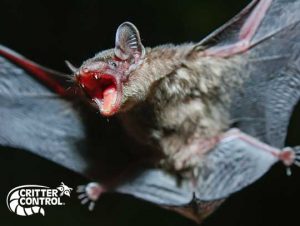 As both mainstays of Halloween iconography and inspiration for beloved comic book characters, bats are revered for so many reasons. Unfortunately, bats are also often stigmatized by myths and misconceptions. Because of this, many have difficulty separating fact from fiction regarding these incredibly fascinating creatures. To better understand the bats local to the Boston area, here are seven bat facts that every homeowner should know.
As both mainstays of Halloween iconography and inspiration for beloved comic book characters, bats are revered for so many reasons. Unfortunately, bats are also often stigmatized by myths and misconceptions. Because of this, many have difficulty separating fact from fiction regarding these incredibly fascinating creatures. To better understand the bats local to the Boston area, here are seven bat facts that every homeowner should know.
Greater Boston Area Bat Facts
-
Bat Species in Boston Are Seasonal
There are four main types of bats that you may encounter in Massachusetts. However, which type you encounter is determined by season. In the summer, you are more likely to see northern long-eared bats and tricolored bats. In the winter, you are more likely to encounter little brown bats or big brown bats.
-
You Can Find Bats on Almost Every Continent
Bats are one of the most diverse groups of vertebrates and mammals in the world, placing only second to rodents in the number of species and sub-species present worldwide. In fact, there is a bat presence on every continent on the planet, except for Antarctica.
-
Bats Are Not Blind
It is a common myth that bats are blind. While bats do have small eyes and use echolocation, they can actually see just as well as a majority of other mammals.
-
Not All Bats Are Vampires
One of the most famous types of bats is the vampire bat; however, they only amount to three out of over 1,200 bat species. Furthermore, vampire bats almost exclusively live in Central and South America, so if you see a bat in the Boston area you don’t have to worry about it trying to bite you and drink your blood. In fact, one of the best things about bats is that they help balance our ecosystem by eating annoying pests such as mosquitoes—which are far more likely to bite you.
-
Bats Share Bathing Habits With Cats
Household cats and bats may be more similar than you think. Similar to cats, bats actually groom themselves quite regularly in a similar fashion.
-
You Aren’t Likely to Get Rabies From a Bat
Any mammal, including humans, can contract rabies; however, less than 0.5% of bats have rabies—much lower than many other mammals.
-
Bats Are Generally Afraid of Humans
While some people are afraid of bats, there is really no need because bats are much more afraid of humans. Bat attacks are incredibly rare because bats generally try to avoid humans and are not aggressive unless threatened.
However, should a colony of bats take up residence in your Boston area property, they can cause damages, contamination, and disturbances that will require removal. Such handling should only be conducted by professionals who understand the proper ways to remove bats safely, humanely, and legally from your property.
Professional Bat Removal for Boston Homeowners
No matter how important to our ecosystem these creatures may be, bats do not belong in our homes. Often small in size, bats can easily fit into small openings on your roofing, like through torn shingles or uncapped chimneys. When this happens, no amount of bat facts will help you remove them. Instead, you should call the bat removal professionals at Critter Control® of Boston for swift and safe removal services.
Our licensed and trained wildlife technicians are well-versed in the legal regulations surrounding bat removal. Not only can you rely on us to take care of your existing bat problem efficiently and effectively, but we will implement safeguards to prevent one from ever happening again.




